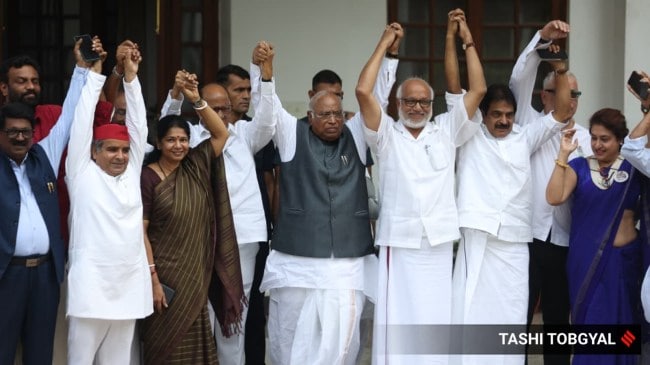INDIA bloc’s Vice-President candidate: Who is retired Supreme Court judge B Sudershan Reddy?
The most consequential judgment in Justice Reddy’s five-year tenure in the top court is the celebrated 'Nandini Sundar versus State of Chhattisgarh' in which the top court banned the Salwa Judum militia.
 India Alliance Leaders led by Mallikarjun Kharge, Sharad Pawar and others during the alliance's declaration of the Vice Presidential candidate Supreme Court retired judge G Sudarshan Reddy in New Delhi on Tuesday. (Express Photo by Tashi Tobgyal)
India Alliance Leaders led by Mallikarjun Kharge, Sharad Pawar and others during the alliance's declaration of the Vice Presidential candidate Supreme Court retired judge G Sudarshan Reddy in New Delhi on Tuesday. (Express Photo by Tashi Tobgyal) The Opposition INDIA alliance on Tuesday named retired Supreme Court judge B Sudershan Reddy its candidate for the September 9 Vice-Presidential election.
Justice Reddy, who retired in 2011, will be the first former Supreme Court judge to contest an election for the post of Vice-President. In 1979, former Chief Justice of India Mohammad Hidayatullah was elected the Vice-President by a consensus among different parties. He was briefly the acting President in 1984. In 1982, former SC judge Justice H R Khanna contested for the office of President and lost to Giani Zail Singh.
Justice Reddy, 79, was born on July 8, 1946, in the village of Akula Mylaram in Ranga Reddy district, on the outskirts of Hyderabad. He graduated from Osmania University in Hyderabad in 1971 and began practising law in the High Court of Andhra Pradesh, serving as the government pleader, and was later elected president of the AP HC Advocates Association. In 1993, he was appointed a judge of that court and in 2005, became the Chief Justice of the Gauhati High Court. He was elevated to the Supreme Court in January 2007.
During his five-year tenure in the top court, Justice Reddy heard several constitutional cases. His most consequential judgment was the celebrated Nandini Sundar versus State of Chhattisgarh in 2011 in which the top court banned the Salwa Judum militia, directing that the practice of using tribal youth as Special Police Officers to counter the Naxal insurgency be brought to an end.
“We, the people as a nation, constituted ourselves as a sovereign democratic republic to conduct our affairs within the four corners of the Constitution, its goals and values. We expect the benefits of democratic participation to flow to us — all of us — so that we can take our rightful place in the league of nations, befitting our heritage and collective genius. Consequently, we must also bear the discipline and the rigour of constitutionalism, the essence of which is accountability of power, whereby the power of the people vested in any organ of the State, and its agents, can only be used for promotion of constitutional values and vision,” he wrote in the landmark ruling.
In 2011, Justice Reddy was also part of the top court Bench that termed the money secreted away in foreign banks as “proceeds of pure and simple theft” and dared the Centre to stop it from holding a general inquiry, in public interest, into the government’s investigations into Indians who have parked “gigantic amounts plundered from national economy” in tax havens across the world.
Upon retirement, in March 2013, he was appointed the first Lokayukta of Goa, but he resigned in just seven months, citing personal reasons. In 2022, the Supreme Court appointed him as an “oversight authority” to ensure that the mining operations in Karnataka follow the Comprehensive Environmental Plan for Mining Impact Zone, a project to restore land in districts such as Ballari, Chitradurga, and Tumakuru affected by rampant mining.
In his home state, Telangana, Justice Reddy was often sought for social justice causes. Earlier this year, he headed the Independent Expert Working Group that the A Revanth Reddy government set up to evaluate the results of the state caste survey. The committee submitted a 300-page report to the CM in July. This brought him in proximity to Congress ministers, mainly Deputy CM Bhatti Vikramarka Mallu and senior ministers N Uttam Kumar Reddy and Ponnam Prabhakar. With the government finding that the report provided invaluable insights into the caste dynamics in the state, state Congress leaders were convinced that the party should find a bigger role for the former judge. Given that he is seen as a politically neutral person with no ideological baggage, he was considered a top choice for the post of Vice-President, a source said.
Writer and former political science professor Kancha Ilaiah Shepherd who was part of the Telangana government working group said Justice Reddy’s keenness on ensuring social justice makes him a suitable candidate for Vice-President. “We worked for nearly two months in the caste survey committee, which he was the head of. He comes across as a person who is committed to his work. He is amiable and takes everyone along with him. We discussed everything that we put in the report. We worked on things until there was very little disagreement before finalising the report. I understood that he was very passionate about ensuring social justice and he was highly in favour of the caste survey. He is very organised and streamlines everything. When I knew him as a young lawyer, he was a great fan and follower of Jayaprakash Narayan. At the time, he had emerged from a socialist background. He was a lawyer for the poor and stood up for them a lot,” said Shepherd.
— With ENS Delhi inputs




